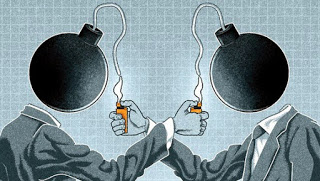
North Korea’s apparent test of a hydrogen bomb spurred a quick and fairly predictable response by investors, given that the US market was closed for the Labor Day holiday. The funding currencies, like the yen and Swiss franc, were bought back, gold rallied, and equities were sold.

While playing up the fact that all options, including a military response, are on the table, and claiming that North Korea is “begging for war,” the US appears set to push for greater sanctions. It is not clear whether there is unanimity in the UN Security Council for more sanctions at this juncture. Shortly following a unanimous vote in the Security Council in early August, the US followed up with unilateral sanctions against Chinese and Russian companies and individuals that reportedly irked Beijing and Moscow. The key sanction that even the US does not seem prepared for is to embargo oil and food.
On the other hand, there are voices urging the acceptance of the fait accompli from North Korea. It has the bomb. It appears to can deliver it. There is a good reason to believe that it could survive a first strike by US allied forces and launch a devastating strike against South Korea, Japan, and possibly the US mainland. A year ago, it launched a ballistic missile from a submarine, and this year, during the US-South Korea-led military exercises, it conducted a test of it most destructive weapon to date.
This fact needs to be accepted. That North Korea joined the ranks of nuclear powers is not new news for investors. The uncertainty now lies with the potential US response. Geopolitical risk often produces a dramatic but short-lived response.
The dollar fell to almost JPY109.20, which is the 61.8% retracement objective of last week’s bounce. The low was set in early Asia as the markets reopened from the weekend. In contrast, the Swiss franc did not record its peak until late in the European session. This is true of its performance against both the dollar and euro. The franc’s outperformance may be a function of market positioning. Many reached the same conclusion we did that the franc is a better funding currency than the yen, given rates, volatility, and central bank commitment.
















